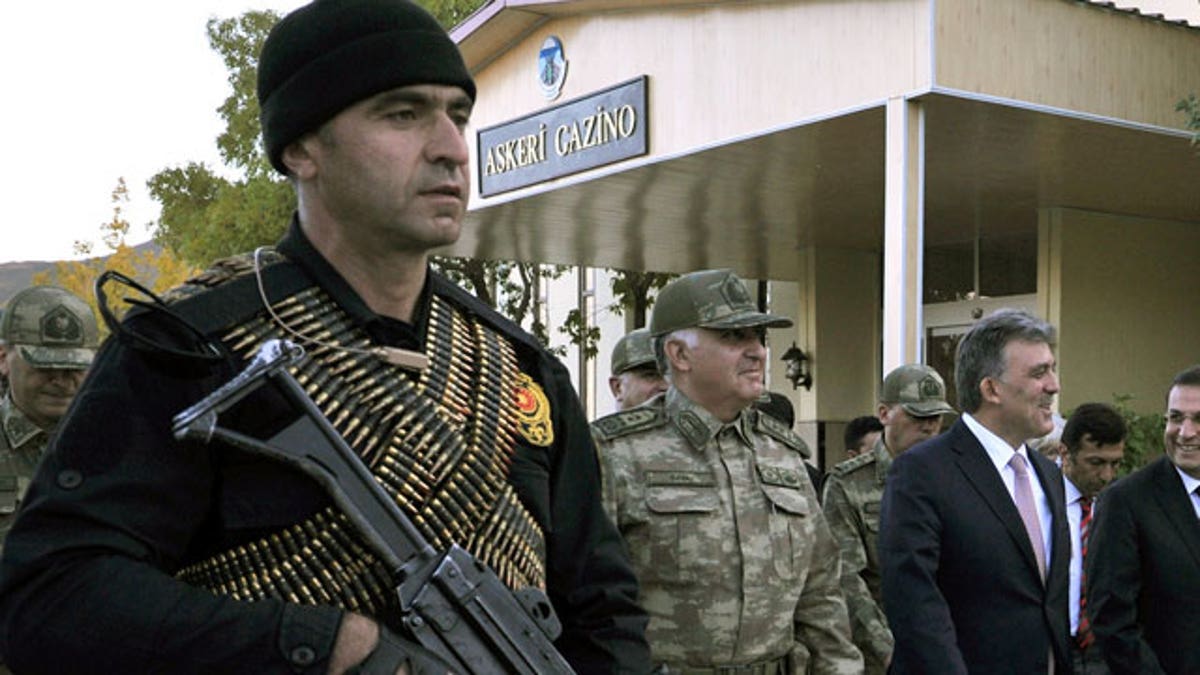
Oct. 14, 2011: Turkish President Abdullah Gul, right, and Chief of Staff Gen. Necdet Ozel, center, walk in Hakkari, Turkey as they visit Turkish troops at the border with Iraq.
ANKARA, Turkey – ANKARA, Turkey-- Turkish soldiers, air force bombers and helicopter gunships launched an incursion into northern Iraq on Wednesday, hours after Kurdish rebels killed 24 soldiers and wounded 18 in attacks along the border.
Prime Minister Recep Tayyip Erdogan canceled a visit to Kazakhstan and held a nationally televised news conference to announce that Turkey had launched the "hot pursuit" operation, wording that officials often use to describe cross-border offensives in northern Iraq.
"We will never bow to any attack from inside or outside Turkey," he said.
Turkey's chief of the military and the interior and defense ministers rushed to the border area to oversee the anti-rebel attacks, and the United States and NATO both issued statements supporting the offensive, the largest in more than three years.
NTV television said Turkish troops have gone some 2.5 miles into Iraq and that helicopters were ferrying commandos across the border. Dogan news agency said more than 20 Kurdish rebels were killed in ensuing clashes, but did not provide a breakdown. Neither report identified its sources.
The incursion for now appears to be limited in scope. Turkey last staged a major ground offensive against Iraq in early 2008.
Wednesday's offensive began hours after the rebels, who are fighting for autonomy in Turkey's southeast, staged simultaneous attacks on military outposts and police stations near the border towns of Cukurca and Yuksekova.
The Interior Ministry first said 26 soldiers were killed and 22 wounded, but Erdogan corrected those figures to 24 dead and 18 wounded, without explaining the discrepancy. It was the deadliest Kurdish rebel attack against Turkey's military since the 1990s.
Kurdish rebel group the Kurdistan Workers' Party, or PKK, said fighting was taking place in two separate areas close to the mountainous Iraqi-Turkish border.
"We have been clashing with the Turkish forces in two areas since around 3 a.m. today," Dostdar Hamo, a spokesman for the rebel group in northern Iraq, told The Associated Press by telephone.
In Baghdad, an Iraqi government spokesman was not immediately available for comment.
Turkey asked Iraq last week to move against rebel bases in northern Iraq, saying "its "patience is running out" in the face of rebel attacks directed at Turkey from Iraqi soil.
"No one should forget that those who make us suffer this pain will be made to suffer even stronger," President Abdullah Gul told reporters Wednesday. "They will see that the vengeance for these attacks will be immense and many times stronger."
A pro-Kurdish party, who is accused by authorities of links to the Kurdish rebel group, called on both the government and the rebels to end the fighting.
"Turkey's most urgent need is peace," the Peace and Democracy Party said. "We call on both the government and the PKK to immediately halt the war, without losing a second."
Dogan news agency said around 200 Kurdish rebels were believed to have participated in the attacks Wednesday.
Turkish warplanes and artillery units, positioned just inside Turkey, struck at the Kurdish rebel bases across the border in response, NTV said.
The rebels have lately intensified their attacks in the country's Kurdish-dominated southeast, killing dozens of members of the country's security force and at least 18 civilians since mid-July.
On Tuesday, a roadside bomb blast killed five policemen and three civilians, including a 4-year-old girl. Wednesday's rebel attack sparked public outrage with many people hanging red and white Turkish flags out of windows and balconies in Ankara, the Turkish capital.
A group of angry Turkish veterans of the 27-year-old Kurdish conflict attempted to storm the office of the prime minister, shouting "martyrs never die!"
The conflict has killed tens of thousands of people since 1984 as Kurdish politicians pushed for greater cultural and political rights for Kurds, who make up around 20 percent of Turkey's 74 million people, such as the right to education in the mother tongue -- a demand that the Turkish government fears could deepen the ethnic divide in the country.
The government has taken steps toward wider Kurdish-language education by allowing Kurdish-language institutes and private Kurdish courses as well as Kurdish television broadcasts. But it won't permit lower-level education in Kurdish.
The European Union, which Turkey is striving to join, has pushed the Turkish government to grant more rights to the Kurds. But EU countries also have urged Kurdish lawmakers to distance themselves from the PKK, which is considered a terrorist group by the United States and the EU.
"As a friend and ally, the United States will continue to stand with the people and government of Turkey in their fight against the PKK, which the United States has officially designated as a terrorist organization," Francis Ricciardone, the U.S. ambassador to Turkey, said in a statement Wednesday. "No political cause, and no religion, can justify terrorism."
The U.S. shares drone surveillance data with Turkey to aid its fight against the Kurdish rebels and is engaged in talks with Turkey for possible deployment of Predator drones on Turkish soil after U.S. forces leave Iraq, according to the Turkish government.
NATO Secretary-General Anders Fogh Rasmussen also condemned the Kurdish rebel violence.
"On behalf of NATO, I condemn in the strongest possible terms the recent attacks in southeastern Turkey, which killed and injured several Turkish soldiers, policemen and civilians, including a child," Rasmussen said in a statement.
Erdogan said Turkey is expecting "active cooperation" from the international community in its fight against the rebels.







































